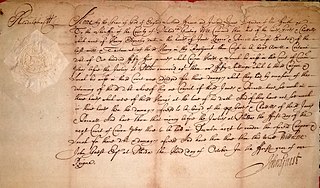Related Research Articles

Common law is the body of law created by judges and similar quasi-judicial tribunals by virtue of being stated in written opinions.

A jury trial, or trial by jury, is a legal proceeding in which a jury makes a decision or findings of fact. It is distinguished from a bench trial, in which a judge or panel of judges makes all decisions.

In common law, a writ is a formal written order issued by a body with administrative or judicial jurisdiction; in modern usage, this body is generally a court. Warrants, prerogative writs, subpoenas, and certiorari are common types of writs, but many forms exist and have existed.
A writ of coram nobis is a legal order allowing a court to correct its original judgment upon discovery of a fundamental error that did not appear in the records of the original judgment's proceedings and that would have prevented the judgment from being pronounced.
Seisin is a legal concept that denotes the right to legal possession of a thing, usually a fiefdom, fee, or an estate in land. It is similar, but legally separate from the idea of ownership.
In law, an alien is generally any person who is not a citizen or a national of a specific country, although definitions and terminology differ across legal systems.
In law, sub judice, Latin for "under a judge", means that a particular case or matter is under trial or being considered by a judge or court. The term may be used synonymously with "the present case" or "the case at bar" by some lawyers.

The Supreme Court of Nepal is the highest court in Nepal. It is designated as the court of record by the Constitution of Nepal. It has appellate jurisdiction over decisions of the seven High Courts and extraordinary original jurisdiction. The court consists of twenty judges and a Chief Justice.
Trinity term is the third and final term of the academic year at the University of Oxford, Trinity College Dublin, Canterbury Christ Church University, and some private schools in the United Kingdom. It runs from about mid-April to about the end of June and is named after Trinity Sunday, which falls eight weeks after Easter, in May or June.
Coram may refer to:
Within the Catholic Church, an ecclesiastical judge is an ecclesiastical person who possesses ecclesiastical jurisdiction either in general or in the strict sense. The judge presides over all baptized persons within their jurisdiction.
In some jurisdictions, an assessor is a judge's or magistrate's assistant. This is the historical meaning of this word.

Phelan Beale was an American attorney and sportsman in New York City who was married to Edith Ewing Bouvier, an aunt of former First Lady of the United States Jacqueline Kennedy Onassis. Beale is probably best remembered as the absent father chronicled in the Grey Gardens saga portrayed in a 1975 movie documentary, 2006 Broadway musical, and 2009 HBO film, all of which were named for his home in East Hampton, New York.
A competent authority is any person or organization that has the legally delegated or invested authority, capacity, or power to perform a designated function. Similarly, once an authority is delegated to perform a certain act, only the competent authority is entitled to take accounts therefrom and no one else.
In legal procedure, misjoinder involves the improper inclusion of one or more parties or causes of action within a lawsuit. The two forms of misjoinder are:

Hirabayashi v. United States, 828 F.2d 591, is a case decided by the Ninth Circuit Court of Appeals and recognized for both its historical and legal significance. The case is historically significant for vacating the World War II–era convictions of Japanese American civil rights leader Gordon Hirabayashi. Those convictions were affirmed in the Supreme Court's 1943 decision Hirabayashi v. United States. The case is legally significant for establishing the standard to determine when any federal court in the Ninth Circuit may issue a writ of coram nobis.
Certain former courts of England and Wales have been abolished or merged into or with other courts, and certain other courts of England and Wales have fallen into disuse.
The Azad Jammu & Kashmir Election Commission is an independent, autonomous, permanent and constitutionally established body responsible for organizing and conducting elections to the Azad Jammu and Kashmir Legislative Assembly, Kashmir council, local governments, and the office of President of Azad Kashmir, as well as the delimitation of constituencies and preparation of electoral rolls. In accordance with the principles set down in the Interim Constitution of AJK, the commission makes the necessary measures to guarantee that the election is conducted honestly, justly, fairly, and in compliance with the law, and that corrupt practices are prevented.

The King's Bench Division of the High Court of Justice deals with a wide range of common law cases and has supervisory responsibility over certain lower courts.
The Election Commission Gilgit-Baltistan is an independent, autonomous, permanent and constitutionally established body responsible for organizing and conducting elections to the Gilgit-Baltistan Legislative Assembly and local governments, Gilgit-Baltistan Council, as well as the delimitation of constituencies and preparation of electoral rolls.
References
- ↑ Lehman, Jeffrey; Phelps, Shirelle (2005). West's Encyclopedia of American Law, Vol. 3 (2 ed.). Detroit: Thomson/Gale. p. 248. ISBN 9780787663742.
- ↑ Bouvier, John; Rawle, Francis (1897). Bouvier's Law Dictionary. Boston: Boston Book Company.